Hiring a professional Valet is a key step in enhancing the guest experience and boosting your brand's image.
This guide will help you understand why businesses choose to hire a Valet, the benefits of having one on your staff, and provide tips for selecting the right candidate.
Determine Why You Need To Hire a Valet and Set Your Budget
Before you hire a Valet, define what services you need and set a realistic budget.
The global valet parking market was valued at $4.5 billion in 2024 and is projected to reach $7.2 billion by 2032, showing steady growth and rising demand for premium guest services.
Scope of work
The scope of work will determine the type of Valet you hire.
Will they simply park cars, assist guests with vehicle-related needs or provide more specialized services, such as handling luxury vehicles?
Handling luxury vehicles requires additional expertise, attention to detail and care to ensure they are parked safely and maintained properly.
Clear expectations regarding their responsibilities will help you identify candidates with the right skills for your establishment.
Number of Valets you need
This depends on the size and nature of your establishment. For smaller venues with limited parking needs, one Valet may be sufficient.
However, for larger establishments or those with high guest volume, you’ll likely need more to efficiently manage the flow of vehicles.
Our research reveals several guidelines for determining how many Valets you’ll need:
- One Valet per 15 to 20 cars for smaller venues or events
- Three to four Valets for every 25 cars at midsize venues or peak times
- One Valet can park and retrieve up to eight cars within 30 to 45 minutes, depending on guest arrival and departure times
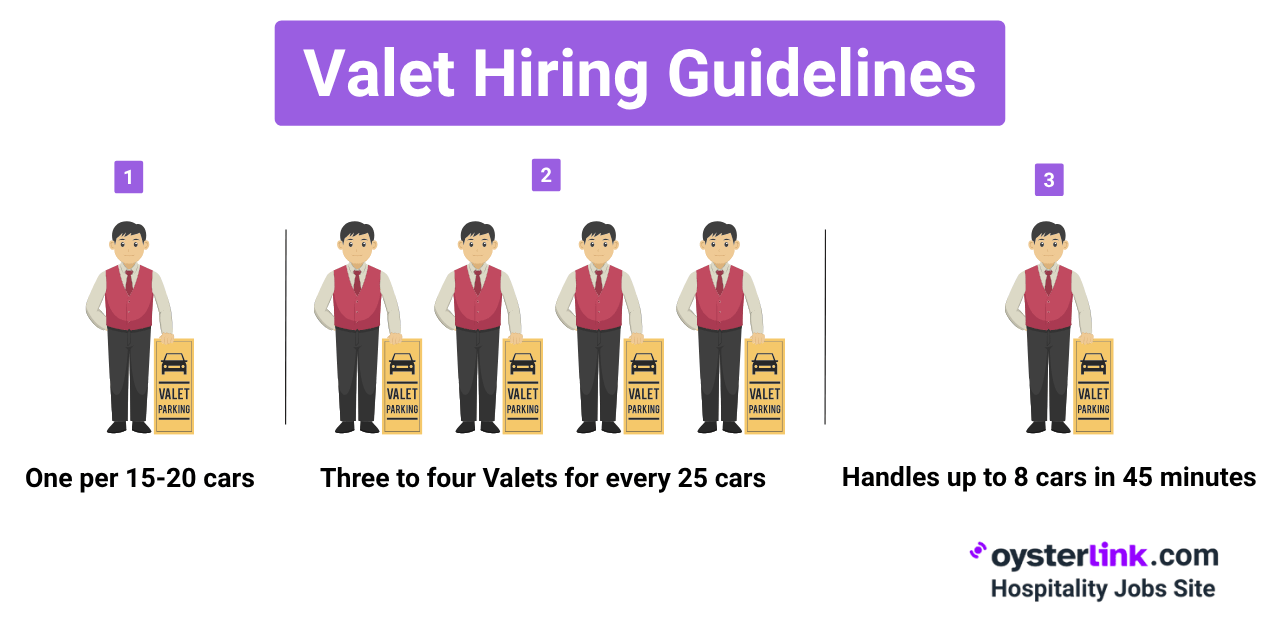
These varying recommendations highlight the importance of considering factors like the venue size, the number of entrances and how fast you want vehicles to be processed.
If your establishment has multiple parking areas or a high volume of guests, additional Valets may be required to manage different sections effectively.
Experience and skill level
An experienced Valet will be more adept at handling high-pressure situations and providing excellent customer service.
If your restaurant, hotel or event venue deals with high-profile guests, hiring someone highly skilled can ensure a smooth experience and help maintain the quality of service expected.
However, if the tasks are more straightforward and the environment less complex, a less experienced Valet may still handle the job effectively.
Budget considerations
Be sure to account for all valet-related expenses, including wages, tips, uniforms, insurance and training.
Tips are taxable and add payroll responsibilities, including reporting and taxes like Social Security and Medicare.
If tips don’t meet minimum wage, employers may need to cover the difference.
High-end venues may also require additional training for valets. Factoring in these costs helps you set a realistic budget and maintain service quality.
Write a Clear Job Description To Hire a Valet With Confidence
Your Valet job description should clearly outline the role's responsibilities, qualifications and benefits while promoting inclusivity to appeal to a diverse pool of applicants.
For a quick overview of what to include, check out this short video:
Sections to include
When writing a Valet job description, include these core sections:
- Responsibilities: Clearly state the duties, such as parking and retrieving vehicles, assisting guests with luggage and maintaining a safe parking area.
- Qualifications: Specify necessary skills, such as a valid driver’s license, experience handling various vehicle types and excellent customer service abilities.
- Benefits: Highlight what your business offers, such as competitive pay, flexible schedules, health insurance or opportunities for advancement.
Avoiding compliance issues
To ensure your job description is compliant with legal requirements:
- Be transparent about pay, including hourly rates, tips or salary ranges, if required by your region's labor laws.
- Include nondiscrimination clauses to promote inclusivity and align with equal employment opportunity laws.
Example:
“We are an equal opportunity employer and welcome applications from all qualified candidates regardless of race, gender or background.”
- Avoid unnecessary or discriminatory job requirements, such as age limits or physical capabilities, unless directly relevant to the role.
Example:
Avoid: "We are seeking a young, energetic Valet to assist with parking."
Better: "We are looking for a qualified Valet with experience handling various vehicle types and excellent customer service skills."
By focusing on clarity, inclusivity and legal compliance, your job description will attract more qualified candidates.
It will also help minimize potential issues such as discrimination claims, a limited candidate pool and non-compliance with labor laws.
How To Post a Job Ad to Hire a Valet Who Fits Your Needs
Hospitality job boards are an excellent recruitment channel for finding skilled Valet candidates.
Below is an overview of some of the top hospitality job boards, including their features and cost considerations.
Qwick
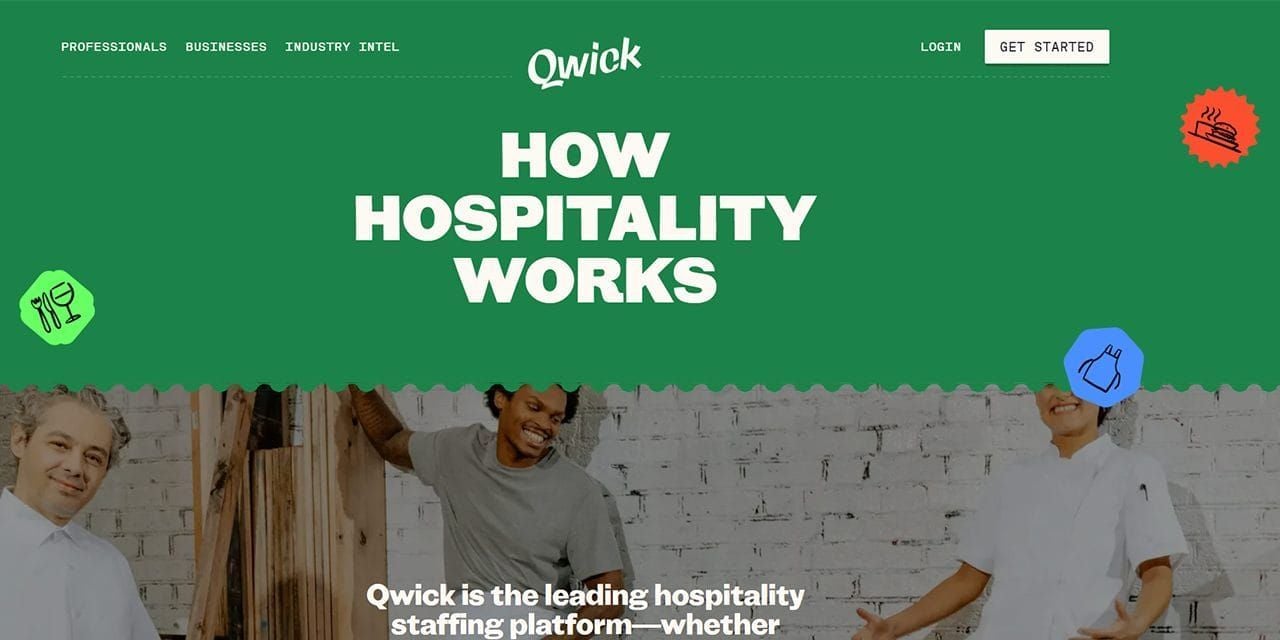
Qwick is a staffing platform that specializes in providing on-demand workers to the hospitality industry, including Valets, Servers, Bartenders and more.
It connects employers with professionals looking for short-term or freelance gigs.
Poached Jobs
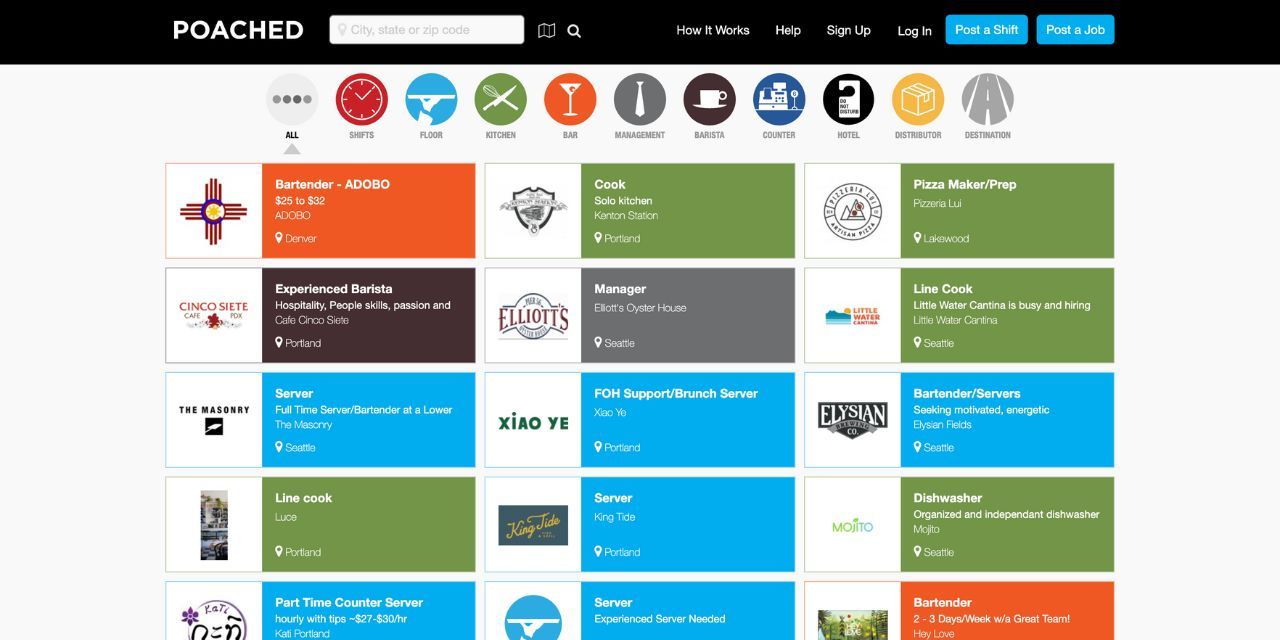
Poached Jobs helps employers find qualified staff for various hospitality roles.
It’s popular in areas with a strong restaurant or hospitality scene, particularly in cities like Portland, Seattle and Colorado.
OysterLink
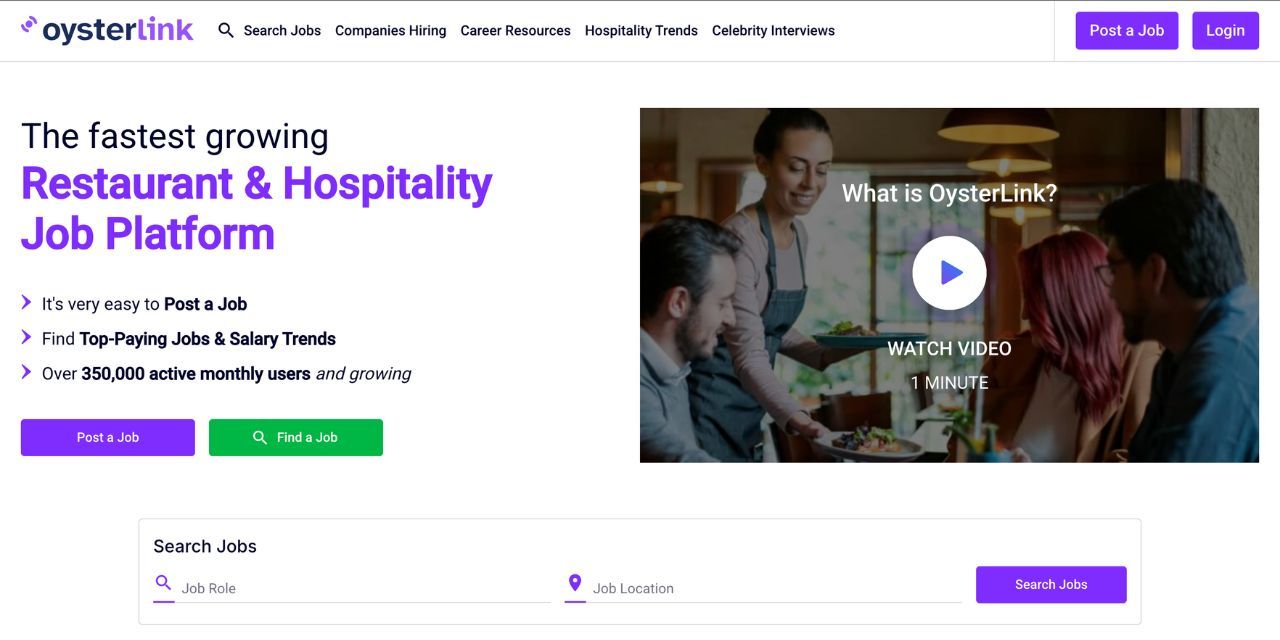
OysterLink is an online job board tailored for restaurant and hospitality employers.
It simplifies the recruitment process by offering comprehensive interview questions, templates for crafting job descriptions and resources designed to streamline hiring.
Staffing agencies
Staffing agencies can be an effective solution for recruiting Valets, especially when you need candidates quickly or lack the time to screen applicants yourself.
They typically maintain a pool of pre-screened candidates, which can help streamline the hiring process.
Below, we’ve outlined the benefits and considerations when working with staffing agencies.
Networking and referrals
Networking and referrals are highly effective for finding qualified Valets, especially in an industry built on trust.
Local hotels and hospitality professionals can often recommend reliable candidates.
You can also encourage current staff to refer people from their networks, as they’re more likely to suggest someone who fits the role and your team culture.
How To Hire a Valet Through Effective Screening and Interviews
A thorough screening and interviewing process is essential for finding Valets who can deliver excellent customer service and handle vehicles responsibly.
This quick video explains what to look for when screening valet candidates.
By carefully reviewing applications, conducting insightful interviews and evaluating driving skills, you can ensure you hire qualified candidates who align with your business standards.
Screening applications
When reviewing resumes for Valet candidates, focus on:
- Relevant experience: Look for prior valet, parking or customer service roles.
- Certifications: Prioritize candidates with certifications like defensive driving or customer service training.
- Driving records: A clean driving record is critical, as it demonstrates responsibility and ensures compliance with insurance requirements.
Conducting interviews
Asking a mix of general, experience-based and situational questions is important to assessing whether a candidate is well-suited for the position.
Each type of question offers valuable insights into different aspects of the candidate's abilities and character.
For more tips, check out our Top 14 Valet Interview Questions to help you identify the right candidate.
Evaluating driving skills
Set up a safe and controlled environment to assess candidates’ ability to handle different vehicle types, maneuver in tight spaces and park efficiently.
Ensure all evaluations comply with legal requirements and consider liability insurance coverage during testing.
Observing their confidence and caution while driving can help you gauge their readiness for the role.
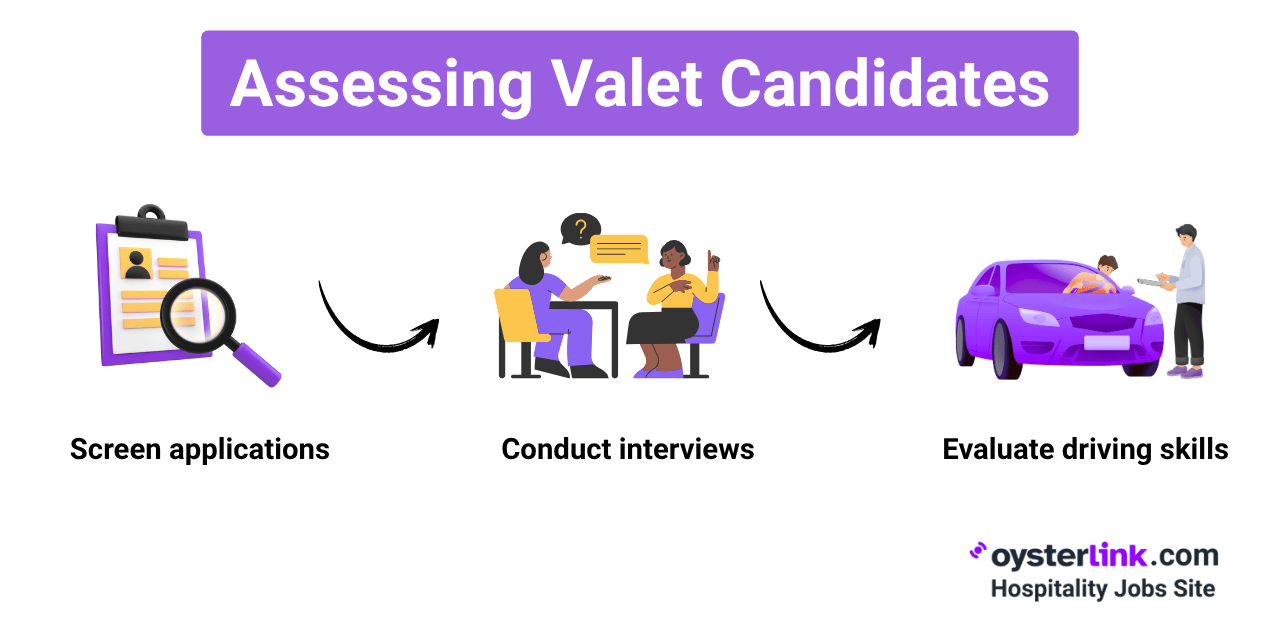
Performing Background Checks Before You Hire a Valet
Background checks are a vital step in hiring Valets to ensure safety, reliability and trustworthiness.
By reviewing driving records, contacting references and conducting criminal and drug screenings, you can protect your business, guests and vehicles from potential risks.
Verifying driving history
A thorough driving record check is important for Valet hires, as their primary responsibility involves handling vehicles safely.
Look for any red flags, such as traffic violations, tickets or suspended licenses, which may indicate a lack of caution or reliability.
Access driving records through your local Department of Motor Vehicles (DMV) or similar authority and ensure you comply with legal requirements for obtaining this information.
Contacting references
References from previous employers provide valuable insights into a candidate’s reliability and performance.
Ask questions, such as:
- “Was the candidate punctual and responsible with their duties?”
- “How did they handle high-pressure situations?”
- “Were there any concerns about their trustworthiness or behavior?”
This feedback helps you gauge whether the candidate can meet your standards for professionalism and customer service.
Additional screening measures
Consider conducting criminal background checks to avoid hiring individuals with theft-related convictions, which could lead to customer complaints or liability issues.
Drug screenings may also be necessary, as some insurance policies exclude coverage for incidents involving drivers under the influence of drugs or alcohol.
Implementing these measures ensures your Valet meets the highest safety and ethical standards.
How To Make a Competitive Offer To Hire a Valet
Creating a compelling job offer is key to securing the right candidate.
Highlight salary, benefits and growth opportunities to attract skilled professionals and set the foundation for a successful working relationship.
Negotiating salary and perks
Research average Valet salaries in your state and consider additional perks, such as providing uniforms, sharing tips and offering training opportunities to enhance job appeal.
Transparent discussions about pay and benefits during the negotiation process can help align expectations and foster goodwill from the outset.
Setting expectations and onboarding
Clearly outline your expectations for the role, including punctuality, customer service standards and vehicle safety.
Once hired, ensure a seamless onboarding process by offering hands-on training, reviewing key procedures and introducing the new hire to your team and operational workflows.
Comprehensive onboarding improves performance and job satisfaction, reducing the likelihood of turnover.
Common Challenges When Hiring Valets
Hiring Valets can present unique challenges, such as skill gaps, turnover issues and ensuring high service standards.
Addressing these challenges proactively can help create a more effective and stable valet team.
1. Retaining skilled Valets
Retention is particularly challenging in high-turnover roles like valeting, with most Valets (36%) quitting within their first year.
To foster loyalty, it's important to offer competitive pay, supportive management and incentives like performance bonuses or opportunities for career growth.
Regular recognition of employee contributions can boost morale and encourage long-term commitment.
2. Handling skill mismatches
If new hires underperform, it's crucial to identify skill gaps early through performance evaluations and open feedback.
Offering targeted training sessions to improve specific areas — such as vehicle handling, efficiency or customer service — can help employees develop the skills needed for the role.
A supportive approach can turn skill mismatches into growth opportunities.
3. Managing high-pressure situations
Valets often work in fast-paced environments, especially during peak hours or busy events.
Ensuring your staff is prepared to handle high-pressure situations is critical.
Training in stress management, clear communication and prioritizing tasks can help employees stay calm and efficient, even under pressure.
Addressing these challenges through proper training, retention strategies and support systems will ensure your Valet operates smoothly, upholds high standards and contributes to a positive guest experience.
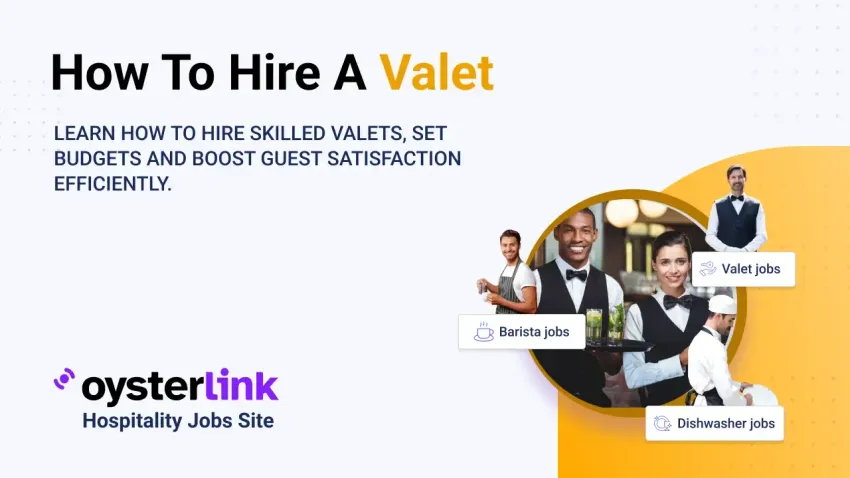









Loading comments...